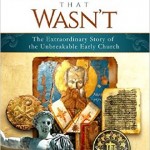Rod Dreher has asked his readers to pick three books about Christianity to recommend to those who know little about it. In response to his fairly specific ground rules, Leah Libresco picked Mere Christianity, by C.S. Lewis, Orthodoxy, by G.K. Chesterton, and The Brothers Karamazov, by Dostoevsky. My favorite passage from her post:
Ok, and my second choice is, also predictably, Orthodoxy by G.K. Chesterton. If Mere Christianity helps make Christianity comprehensible, Orthodoxy makes it weird again.
I hadn’t planned on responding to this question myself; my first response was, “What? Only three books?” But then I reflected that Leah’s done two-thirds of the work for me. Mere Christianity is the obvious starting point; and Orthodoxy is delightful for the way it captures Christianity from the successful seeker’s point of view, and I can’t think of anything better to put in its place.
The problem is the third book. Dreher’s rules forbid choosing a book specific to some particular flavor of Christianity, but few books are written from a point of view that covers the Christian waterfront without slighting one flavor or another (which is, of course, why Mere Christianity is the obvious choice). So I’m going to take refuge in the fact that Catholicism is the largest flavor of Christianity, and pick the Catholic Youth Catechism, or Youcat:
We’ve been reading through the Youcat with our second son who is preparing for his confirmation, and I find it to be an excellent and accessible summary of Christian theology, at least for those denominations who subscribe to the Nicene Creed. If you want to know what Christians in general have believed throughout the ages, start here. (I like the full Catechism of the Catholic Church also, but it’s a bit daunting for a newbie.)











